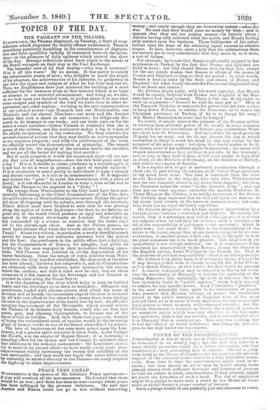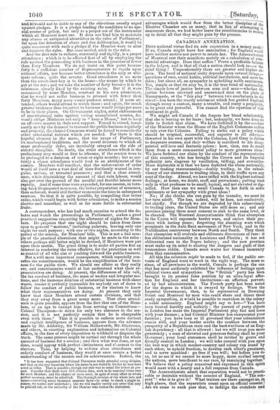POWER OF THE CONSTITUENCIES.
ATTENDANCE is not of much use in Parliament unless business be transacted in an orderly way ; but the first step towards a more orderly procedure would be a better attendance, and that constituencies may powerfully help to enforce. Should a party form itself in the House of Commons for the purpose, the avowed support of the electoral bodies would be a very influential assist- ance : from time to time the constituencies might send in re- cruits; but even should no set of men be found among those already elected with sufficient foresight and firmness of purpose to take the reform in hand, constituencies, if they pleased, might set about the formation of such a band. The test of candidates might be a pledge to make such a stand in the House of Com- mons as should secure a proper conduct of business.
Such a pledge would be one perfectly just and decorous to exact,
aatli itiwould not be liable to any of the objections usually urged against pledges. It is a pledge binding the candidate to no spe- cial course of policy, but only to a proper use of the instrument which all Members must use. It does not bind him to maintain any abuses or antiquated absurdities in the rules of Parliament; for upon due detection of abuse and due deliberation, it would be quite consistent with such a pledge if the Member were to alter and improve the rules. But once settled, stick-to the rules.
And the first rule to enforce, constantly and rigidly, is a proper attendance ; which is to be effected first of all 'by employing the rule against the proceeding with business in the presence of fewer than fusty Members. We do not insist on this point because forty is a sufficient number of Representatives to decide upon national affairs, nor because better attendance is the only or ulti- mate reform ; quite the reverse. Good attendance is no more than the street-door-key is to the house—the means by which to get at the rest; and we take the number of forty because it is the minimum already fixed by the existing rules. But if it were announced by some Member, constant in his own attendance, that he would not suffer business to proceed with fewer than forty Members, many more would perforce attend ; if more at- tended, others would attend to watch those ; and again, the much greater briskness thus imparted to business would oblige yet more to be in their places. On Government nights, strict enforcement of constitutional rules against voting unexplained monies, &c. would oblige Ministers not only to " keep a House," but to keep an effective muster in their own support. Forced to attend, inces- santly met by the demand to transact the public business regularly and properly, the elected Commons would be forced to concede the other substantial reforms which are needed. For there is this hopeful element in the move, that the usage of Parliament, its unabandoned traditions, and the moral decorum to which all must professedly defer, are inevitably arrayed on the side of stricter discipline. No doubt, the strict attendance which is the preliminary step would at first be irksome, if the session were to be prolonged to a duration of seven or eight months ; but as cer- tainly a closer attendance would lead to an abridgment of the session. Members will recollect, that the enforcement of order would of itself save a vast deal of time fruitlessly wasted in irre- gular, useless, or retracted processes ; and that a close attend- ance, while diminishing the amount of that vain labour, would also get over the ground of the needful and fruitful labour more rapidly. And if some time were expended, for one session, in turn- ing back ill-prepared measures, the better preparation of measures, thus enforced, would still further economize the time in subsequent sessions_ So that it is quite possible, by compelling that better order, which would begin with better attendance, to make a session shorter and smoother, as well as far more fertile in substantial fruits.
A correspondent, who has had much occasion to attend the de- bates and watch the proceedings in Parliament, makes a good practical suggestion respecting the allotment of nights for Mem- bers. He proposes that one night should be taken from those open to general "motions," including palavers, leaving only one night for such purpose ; with one or two nights, according to the period of the session, for Members' bills. This is not a bad sam- ple of the practical alterations that might be made in the rules : ethers perhaps still better might be devised, if Members were put upon their mettle. The great thing is to make all parties feel an interest-in rendering the rules effective, for the protection as well- as control of all who aim at pushing forward the public business. But a still more important consequence, which especially con- -celms the constituencies, would be the simplification of the busi- ness fur the public view. We should see affairs as they really are, and constituencies would at last understand what their re- presentatives are doing. At present, the diffuseness of idle talk, the lax conduct of business, the mass of useless and irregular mo- tions, and the immense dilution of substantial business with sheer waste, render it perfectly impossible for anybody out of doors to follow the conduct of public business, or for electors to know what their representatives are doing. At present they only know that their Members attend certain divisions, and that they stay away from a great many more. That close attend- ance is quite possible, appears from the fact that one of the Mem- bers, of an age to exempt him from serving on Committees— Colonel Thompson—is down for only two absences in the ses- sion, and it is not perfectly certain that he is chargeable even with those.* That it is possible to enforce more distinct and explicit intelligence of business, appears from the advance made by Mr. Adderley, Sir William Molesworth, Mr. Gladstone, and others, in exacting explanation and information on Colonial affairs, in the face of every disposition to withhold or disguise the truth. The same process might be carried out through the whole amount of business for a session ; and then what was done, or not done, would appear with perfect distinctness and clearness to the electors. Thus, by helping to enforce close attendance and orderly conduct of business, they would at once secure a better understanding of the session and its achievements. Indeed, the It has been suggested that Colonel Thompson really attended every division, and that on the two occasions where his name is not found in the list he may have acted as teller. That is possible; though our rule was to count the tellers as pre- sent. Coisider that there were 219 division-lists, each to be searched twice over for each Member; and the chance of some error, in spite of every effort to attain perfect accuracy, must be admitted. The thorough revision of the whole lists and names—involving many thousand separate facts—in order to check a single in- stance, we cannot now undertake; but we will readily rectify any error that may be pointed out, on the authority of the Member who makes the statement. advantages which would flow from the better discipline of the Elective Chamber are so many, that in lieu of attempting to enumerate them, we had better leave the constituencies to reckon up in detail all that they might gain by the process.



























 Previous page
Previous page